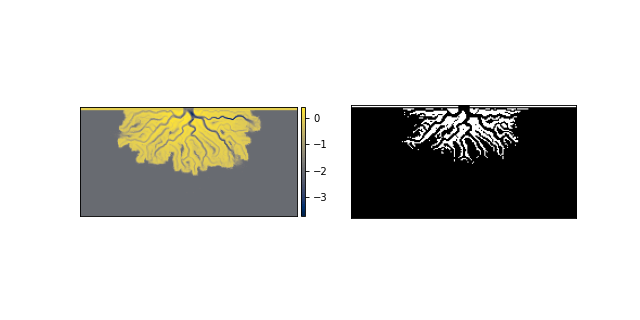deltametrics.mask.ElevationMask¶
- class deltametrics.mask.ElevationMask(*args, elevation_threshold, elevation_offset=0, cube_key='eta', **kwargs)¶
Elevation mask.
This mask implements a binarization of a raster based on elevation values.
Examples
Initialize the ElevationMask from elevation data:
(
Source code,png,hires.png)
- __init__(*args, elevation_threshold, elevation_offset=0, cube_key='eta', **kwargs)¶
Initialize the ElevationMask.
Note
Needs docstring!
Methods
__init__(*args, elevation_threshold[, ...])Initialize the ElevationMask.
from_array(_arr)Create an ElevationMask from an array.
show([ax, title, ticks, colorbar])Show the mask.
trim_mask(*args[, value, axis, length])Replace a part of the mask with a new value.
Attributes
An optional offset to apply to input threshold.
Elevation value used to threshold the elevation data.
Binary mask values as integer
Binary mask values.
Type of the mask (string)
shapeGeneric property for ThresholdValueMask threshold.
variables- __getitem__(var)¶
Implement slicing.
Return values directly from the mask. Supported variables are only ‘mask’ or ‘integer’.
- property elevation_offset¶
An optional offset to apply to input threshold.
- property elevation_threshold¶
Elevation value used to threshold the elevation data.
Determined during instantiation as the sum of input arguments to
__init__elevation_threshold and elevation_offset.
- static from_array(_arr)¶
Create an ElevationMask from an array.
Note
Instantiation with from_array will attempt to any data type (dtype) to boolean. This may have unexpected results. Convert your array to a boolean before using from_array to ensure the mask is created correctly.
- Parameters:
_arr (
ndarray) – The array with values to set as the mask. Can be any dtype but will be coerced to boolean.
- property integer_mask¶
Binary mask values as integer
Important
integer_mask is a boolean array as
0and1(integers). It is not suitible for multidimensional array indexing; see alsomask.Read-only mask attribute.
- Type:
ndarray
- property mask¶
Binary mask values.
Important
mask is a boolean array (not integer). See also
integer_mask.Read-only mask attribute.
- Type:
ndarray
- property mask_type¶
Type of the mask (string)
- show(ax=None, title=None, ticks=False, colorbar=False, **kwargs)¶
Show the mask.
The Mask is shown in a matplotlib axis with imshow. The mask values are accessed from
integer_mask, so the display will show as0forFalseand1forTrue. Default colormap is black and white.Hint
Passes **kwargs to
matplotlib.imshow.- Parameters:
ax (
matplotlib.pyplot.Axes) – Which axes object to plot into.
- property threshold¶
Generic property for ThresholdValueMask threshold.
- trim_mask(*args, value=False, axis=1, length=None)¶
Replace a part of the mask with a new value.
This is sometimes necessary before using a mask in certain computations. Most often, this method is used to manually correct domain edge effects.
- Parameters:
*args (
BaseCubesubclass, optional) – Optionally pass a Cube object to the mask, and the dimensions to trim/replace the mask by will be inferred from the cube. In this case,axisandlengthhave no effect.value – Value to replace in the trim region with. Default is
False.axis – Which edge to apply the trim of
lengthto. Default is 1, the top domain edge.length – The length of the trim. Note that this is not the array index.
Examples